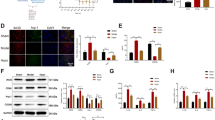Summary
Under global cerebral ischemia, the effect of different brain temperature on cerebral ischemic injury was studied. Male Sprague-Dawley rats were divided into normothermic (37–38°C) ischemia, mild hypothermic (31–32°C) ischemia, hyperthermic (41–42°C) ischemia and sham-operated groups. Global cerebral ischemia was established using the Pulsinelli four-vessel occlusion model and brain temperature was maintained at defined level for 60 min after 20-min ischemia. The expression of c-fos protein and the levels of malondialdehyde (MDA) and lactate in brain regions were detected by immunochemistry and spectrophotometrical methods, respectively. C-fos positive neurons were found in the hippocampus and cerebral cortex after cerebral ischemia reperfusion. Mild hypothermia increased the expression of c-fos protein in both areas, whereas hyperthermia decreased the expression of c-fos protein in the hippocampus at 24 h reperfusion, and the cerebral cortex at 48 h reperfusion when compared to normothermic conditions. In normothermic, mild hypothermic and hyperthermic ischemia groups, the levels of MDA and lactate in brain tissue were increased at 24, 48 and 72 h reperfusion following 20-min ischemia as compared with the sham-operated group (P<0.01). The levels of MDA and lactate in mild hypothermic group were significantly lower than those in normothermic group (P<0.01). It is suggested that brain temperature influences the translation of the immunoreactive protein product of c-fos after global cerebral ischemia, and MDA and lactate are also affected by hypothermia and hyperthermia.
Similar content being viewed by others
References
Campos F, Blanco M, Barral D, et al. Influence of temperature on ischemic brain: basic and clinical principles. Neurochem Int, 2012, 60(5):495–505
Yenari MA, Han HS. Neuroprotective mechanisms of hypothermia in brain ischaemia. Nat Rev Neurosci, 2012, 13(4):267–278
Zhang H, Zhou M, Zhang J, et al. Therapeutic effect of post-ischemic hypothermia duration on cerebral ischemic injury. Neurol Res, 2008, 30(4):332–336
Zhang H, Zhou M, Zhang J, et al. Initiation time of post-ischemic hypothermia on the therapeutic effect in cerebral ischemic injury. Neurol Res, 2009, 31(4):336–339
Zhang H, Xu G, Zhang J, et al. Mild hypothermia reduces ischemic neuron death via altering the expression of p53 and bcl-2. Neurol Res, 2010, 32(4):384–389
Pulsinelli WA, Brierley JB. A new model of bilateral hemispheric ischemia in the unanesthetized rat. Stroke, 1979, 10(3):267–272
Prakasa Babu P, Yoshida Y, Su M, et al. Immunohistochemical expression of Bcl-2, Bax and cytochrome c following focal cerebral iscbemia and effect of hypothermia in rat. Neurosci Lett, 2000, 291(3):196–200
Eberspächer E, Werner C, Engelhard K, et al. Long-term effects of hypothermia on neuronal cell death and the concentration of apoptotic proteins after incomplete cerebral ischemia and reperfusion in rats. Acta Anaesthesiol Scand, 2005, 49(4):477–487
Jieyong B, Zhong W, Shiming Z, et al. Decompressive craniectomy and mild hypothermia reduces infarction size and counterregulates Bax and Bcl-2 expression after permanent focal ischemia in rats. Neurosurg Rev, 2006, 29(2):168–172
Eberspächer E, Werner C, Engelhard K, et al. The effect of hypothermia on the expression of the apoptosis-regulating protein Bax after incomplete cerebral ischemia and reperfusion in rats. J Neurosurg Anesthesiol, 2003, 15(3):200–208
Satoh K, Niwa M, Binh NH, et al. Increase of galectin-3 expression in microglia by hyperthermia in delayed neuronal death of hippocampal CA1 following transient forebrain ischemia. Neurosci Lett, 2011, 504(3):199–203
Tsai YW, Yang YR, Wang PS, et al. Intermittent hypoxia after transient focal ischemia induces hippocampal neurogenesis and c-Fos expression and reverses spatial memory deficits in rats. PLoS One, 2011, 6(8):e24001
Akaji K, Suga S, Fujino T, et al. Effect of intra-ischemic hypothermia on the expression of c-Fos and c-Jun, and DNA binding activity of AP-1 after focal cerebral ischemia in rat brain. Brain Res, 2003, 975(1–2):149–157
Mancuso A, Derugin N, Hara K, et al. Mild hypothermia decreases the incidence of transient ADC reduction detected with diffusion MRI and expression of c-fos and hsp70 mRNA during acute focal ischemia in rats. Brain Res, 2000, 887(1):34–45
Kobayashi MS, Asai S, Ishikawa K, et al. Global profiling of influence of intra-ischemic brain temperature on gene expression in rat brain. Brain Res Rev, 2008, 58(1): 171–191
Abas F, Alkan T, Goren B, et al. Neuroprotective effects of postconditioning on lipid peroxidation and apoptosis after focal cerebral ischemia/reperfusion injury in rats. Turk Neurosurg, 2010, 20(1):1–8
Woo CW, Lee BS, Kim ST, et al. Correlation between lactate and neuronal cell damage in the rat brain after focal ischemia: An in vivo 1H magnetic resonance spectroscopic (1H-MRS) study. Acta Radiol, 2010, 51(3): 344–350
Natale JA, D’Alecy LG. Protection from cerebral ischemia by brain cooling without reduced lactate accumulation in dogs. Stroke, 1989, 20(6):770–777
Karaszewski B, Wardlaw JM, Marshall I, et al. Early brain temperature elevation and anaerobic metabolism in human acute ischaemic stroke. Brain, 2009, 132(Pt 4):955–964
Author information
Authors and Affiliations
Corresponding author
Additional information
This project was supported by the Key Projects of Scientific Research Funds from Health Department of Hubei Province (No. JX5A04), China.
Rights and permissions
About this article
Cite this article
Zhang, H., Li, L., Xu, Gy. et al. Changes of c-fos, malondialdehyde and lactate in brain tissue after global cerebral ischemia under different brain temperatures. J. Huazhong Univ. Sci. Technol. [Med. Sci.] 34, 354–358 (2014). https://doi.org/10.1007/s11596-014-1282-4
Received:
Revised:
Published:
Issue Date:
DOI: https://doi.org/10.1007/s11596-014-1282-4



